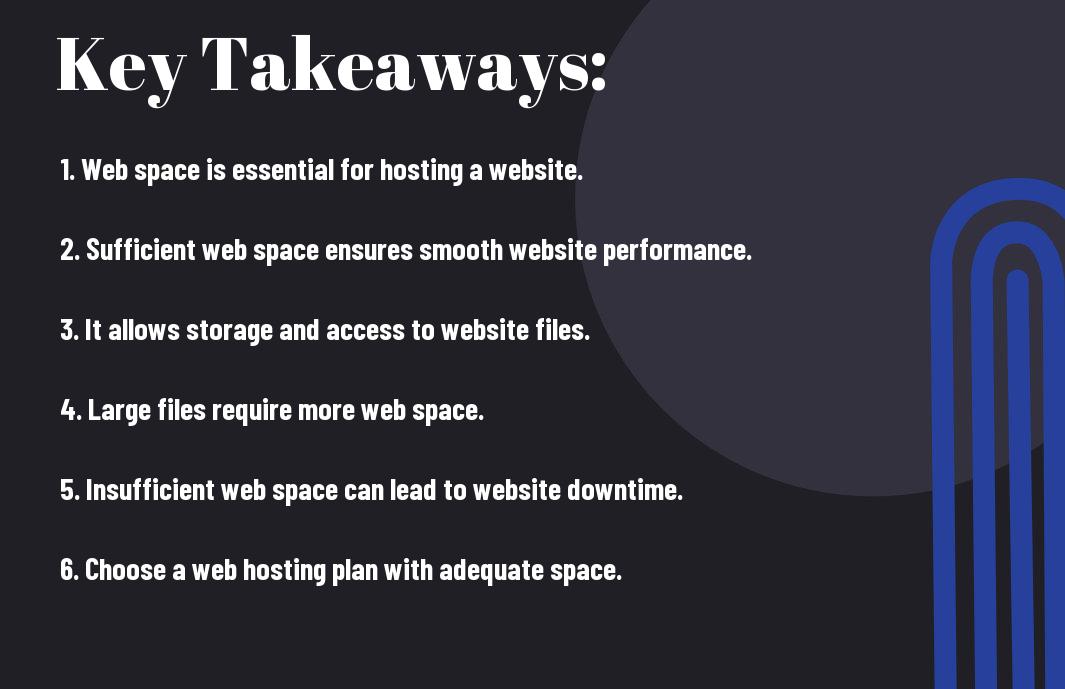Envision this scenario: you’ve spent countless hours designing and developing your website, carefully curating content, and perfecting the user experience. However, without adequate web space, all of your hard work could be in jeopardy. Web space is the amount of storage available to you on a server, and it plays a crucial role in the success of your website. Not having enough web space can lead to slow loading times, downtime, and ultimately, a negative impact on your SEO ranking. On the other hand, having ample web space allows you to easily handle high traffic volumes, maintain optimal website performance, and store all necessary files and data securely. In this blog post, we’ll explore the significance of web space and why it’s essential for the overall success of your website.
Key Takeaways:
- Web space is crucial for website performance: Having sufficient web space ensures that your website can handle high levels of traffic and deliver a seamless user experience.
- Storage needs to be carefully assessed: Understanding the amount of content, media, and data your website contains will help determine the appropriate web space required to accommodate it all.
- Quality web hosting is essential: Choosing a reliable web hosting provider that offers adequate web space and ensures minimal downtime is crucial for the success of your website.


Defining Web Space and its Functionality
While creating and maintaining a website, it is essential to understand the concept of web space and its role in the overall performance of your site. To gain a deeper insight into this subject, you should learn these useful pro-tips in mastering web space.
What is Web Space?
Web space refers to the amount of storage capacity allocated to your website on a server. This space is where all your website files, images, videos, databases, and other content are stored. Essentially, it is the physical location where your website data resides. The web space is typically measured in megabytes or gigabytes, depending on the hosting plan you choose.
How Web Space Impacts Site Loading Speed and Uptime
When it comes to your website, the amount of web space you have can directly impact its loading speed and uptime. The size of your website files stored in the web space can affect the time it takes for your site to load. If your web space is limited, you might experience slower loading times and even downtime if your site exceeds its allocated space. On the other hand, having an adequate amount of web space ensures that your website loads quickly and remains accessible at all times.
Understanding the Importance of Web Space for Your Website
Selecting the Right Amount of Web Space
Not all web hosting plans are created equal. When it comes to selecting the right amount of web space for your website, you need to consider several factors. It’s crucial to ensure you have enough space to accommodate your current needs and also allow for future growth.
Assessing Your Website’s Needs
Assessing Your Website’s Needs
Before choosing a web hosting plan, it’s essential to assess your website’s needs. You should consider the size of your website, including the number and size of files, images, and any multimedia content. Additionally, take into account the amount of traffic you expect to receive. By understanding your website’s specific requirements, you can select a hosting plan that provides an adequate amount of web space to support your online presence.
Planning for Future Growth and Scalability
Planning for Future Growth and Scalability
When selecting the right amount of web space, it’s crucial to plan for future growth and scalability. As your website grows, so will your need for additional space. Consider the potential for expansion, including adding more content, features, or functionality to your site. By choosing a web hosting plan that allows for scalability, you can accommodate growth without the need to switch providers or upgrade to a higher plan. This can save you time and resources in the long run.
By understanding your website’s needs and planning for future growth, you can select the right amount of web space for your website. It’s important to ensure you have enough space to support your current needs while also allowing for scalability in the future. Taking the time to assess your requirements and plan for growth can save you from potential issues and limitations down the line.
Web Space Management
Despite the common misconception, web space is not just about the visible elements on your website; it’s also about the empty space. White space, or negative space, plays a crucial role in web design, allowing your content to breathe and ensuring a better user experience. You can learn more about the effective use of white space in web design in this A Guide To Effective Use of White Space in Web Design.
Tools for Monitoring Web Space Usage
When it comes to managing your web space, it’s important to have the right tools to monitor its usage. There are various software and online services available that can help you track your website’s storage, bandwidth, and overall performance. These tools allow you to stay informed about your web space usage and make necessary adjustments to optimize your website’s performance and user experience.
Best Practices for Optimizing Web Space Efficiency
One of the best practices for optimizing web space efficiency is to declutter and organize your website regularly. Deleting unnecessary files, compressing images, and minimizing the use of plugins and other heavy elements can significantly reduce your web space usage. Additionally, consider utilizing content delivery networks (CDNs) and caching to improve loading times and reduce the strain on your web space.
Cost Considerations
Now that you understand the importance of web space for your website, it’s time to consider the cost implications. Choosing the right web space for your website is crucial, and it’s essential to strike the right balance between cost and performance.
Understanding Pricing Models for Web Space
When it comes to web space, there are various pricing models to consider. These can include monthly or annual subscription fees, pay-as-you-go pricing, or tiered plans based on your storage and bandwidth needs. It’s important to carefully consider the pricing models offered by different web hosting providers and choose one that aligns with your budget and website requirements. Keep in mind that some providers may offer introductory rates that increase after the initial sign-up period, so be sure to factor in potential long-term costs.
Balancing Budget and Performance Requirements
As you consider the cost of web space, it’s crucial to balance your budget with your performance requirements. While it may be tempting to opt for the cheapest option available, you must also consider the impact on your website’s performance. Choosing low-quality web space can result in slower loading times, downtime, and security vulnerabilities. On the other hand, investing in a higher-tier plan with more resources than you need may result in unnecessary expenses. It’s essential to evaluate your website’s traffic, content, and functionality to determine the right amount of web space needed to meet your performance requirements while staying within your budget.
Understanding the Importance of Web Space for Your Website
Q: Why is web space important for a website?
A: Web space is important for a website because it determines the amount of storage available for your website’s files, data, and media. Without sufficient web space, your website may not be able to function properly and store necessary content.
Q: How much web space do I need for my website?
A: The amount of web space you need for your website depends on the size and complexity of your site. Generally, small to medium-sized websites can function well with 1-5GB of web space, while larger, more complex websites may require 10GB or more.
Q: What happens if I run out of web space?
A: If you run out of web space, your website may experience performance issues, including slow loading times, errors, or even crashing. It’s important to regularly monitor your web space usage and upgrade your hosting plan if needed to avoid running out of space.
Q: Can I increase my web space if I need more in the future?
A: Yes, most web hosting providers offer the option to upgrade your hosting plan to increase your web space as your website grows. It’s important to choose a hosting provider that offers scalable and flexible hosting plans to accommodate your future needs.
Q: What are the consequences of not having enough web space for my website?
A: Not having enough web space for your website can result in data loss, website downtime, and a poor user experience for visitors. Additionally, inadequate web space can limit your ability to add new content, features, and functionality to your website, hindering its growth and success.
CATEGORY:Web Hosting

